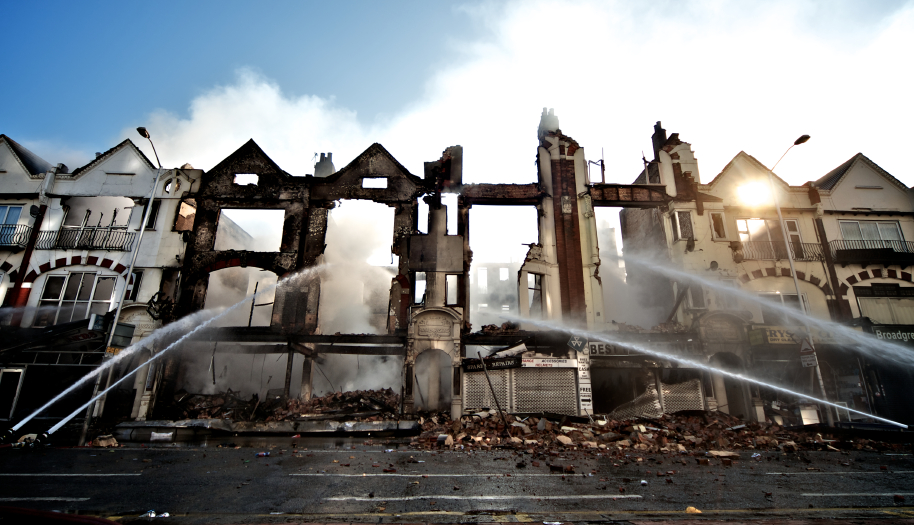[contextly_auto_sidebar]

The CPS response to the 2011 riots was its finest hour, but successive cuts mean today’s service would be unable to cope with a similar level of disorder, says a former senior Crown prosecutor who has asked to remain anonymous. This article first appeared in LegalVoice here
When I was asked to write an article to mark the fifth anniversary of the riots that followed the police shooting of Mark Duggan in 2011, my first reaction was: is it really?
It actually seems like a lifetime ago. And given what has happened to the criminal justice system in the intervening period, I can say from the outset that the lessons learned have been none. And indeed, if a similar situation were to arise today, I am sure that the criminal justice system would struggle to cope with it.
As a result of the austerity cuts, the criminal justice system is now but a sad shadow of its former self – and that is putting it mildly.
First I must declare that these are my personal views and, like many of those who were involved in prosecuting cases during the riots, I now no longer work for the Crown Prosecution Service. In the last six years, an unprecedented number of people have left the service through either voluntary redundancy or in despair. I fall into the latter group. In 2011 it would have been unthinkable for me to have contemplated a life away from the CPS. I remember distinctly the events as they unfolded. It was worrying for everyone as nothing quite like it had ever happened before.
Disorder fuelled by Blackberry messenger, who’d have thought it could happen? And, perhaps most frightening, was that no one really knew how far things would escalate. Myself and a large number of CPS colleagues had no hesitation – we considered it our duty – in volunteering to prosecute night courts and weekend courts. We were paid at the usual rates for weekend and bank holiday courts, but I know we would have all worked pro bono if necessary.
Everything calmed down and letters of thanks arrived. Personal letters from the then DPP and the then Chief Prosecutor for London. I think there was also a letter from the Attorney General.
While there may have been an element of disgust about apparent disproportionate sentences being handed-down to those involved in the riots, it was perhaps difficult for courts to disengage from public opinion. However, I remember at the time prosecutors were advised to follow charging and sentencing guidelines, where they existed, for the relevant public order offences, with no uplifts to reflect the situation or public opinion. Anything else would have gone against all the general principles of sentencing.
I remember at Wood Green Crown Court the then Resident Judge was at pains to say that what had happened in London was ‘wide-scale public disorder’ not ‘riots’, as the legal definition for ‘riot’ wasn’t satisfied.
Sentencing aside, my recollection is that the courts subjected the disorder cases to the same level of scrutiny as they did other cases at the time. Prosecutors had to be ready with all the evidence to hand and it was no excuse to say, for instance, that the CCTV footage was lost in the backlog. However, looking back on that time now, after the whole landscape of the justice system – civil and criminal, has changed beyond recognition, I find myself thinking of the time of the riots as representing our system at its highest point.
There was no question that the police and the CPS had the capacity to cope with such an unprecedented situation at short notice. And the cases could be processed without compromising the other work. The CPS and the police set up specialist operations rooms and departments.
The CPS certainly couldn’t do that now. All the staff and experience have gone. There has been such a turnaround of staff in the CPS that it would not now be easy to find enough prosecutors. There are but a handful of them left.
Where did it all go wrong?
I blame the government cuts that have bitten year-on-year since 2012. I don’t think the general public are really aware of what has happened and that’s the scary thing.
I first knew that the CPS, and the whole criminal justice system as we knew it, was toast within a month of the coalition government coming into power. I was involved in a consultative body (I can’t give details as I do not want to be identified) which was conducting important work around how to reach the most disengaged, disadvantaged and vulnerable communities in the capital and how to encourage them to engage with the criminal justice system.
The project was supported by all the relevant government departments and third-sector agencies. At our first meeting after the election we had to fold as London Councils had pulled its funding. Worse still, nine of the 11 members of the forum had just been, or were in the process of being, made redundant. Those remaining were working for government departments – and the cuts hit the third-sector agencies first. It appeared from that point that criminal justice and law and order wasn’t something that the government had any great interest in funding.
The cuts then began to hit government departments and agencies – and the CPS. In 2012, the CPS centralised its London operations for cost and efficiency reasons. The link between the CPS, the police, and the courts at a local level was forever lost.
And in the last few months the CPS has announced that it will operate ‘satellite’ offices preparing CPS London work – in Preston, Leicester and Cardiff. All cost cutting and cheaper, but it is also faceless bureaucracy at its worst. I also fail to see where the job satisfaction is.
How can you be invested in the future of cases you work on when you can never follow them through the court process? This is justice being delivered with the sausage factory mentality and it doesn’t work. I guess the well-known mantra of CPS senior management of ‘if you don’t like it, then you can leave’ applies here. And indeed many of us of have done – in droves. I just feel sorry for those still there having to work in appalling conditions. I hear there is now a problem with retaining staff – with many leaving after only a few months. There is perhaps a lesson here if anyone chooses to recognise it. But I guess the CPS will say there is nothing it can do due to constraints on its funding, absolving itself of any responsibility for the treatment of its staff.
If the CPS are asked to comment on this, they will deny it as they always do.
But there is a large enough body of people in the country now who know the truth. And indeed it is a sad day when I look back at the time of the London riots as one of the highlights of my prosecution career. And, in conclusion, the system is so stretched now that it would need a massive injection of funding if there were another such event. But that wouldn’t make up for the lost skills and experience which can’t be remedied overnight. Still I suppose they could always bus in prosecutors from Preston and Cardiff to man the night courts – let’s just hope in this situation, that the disorder doesn’t spread outside London.
The author is a former senior Crown prosecutor in London







